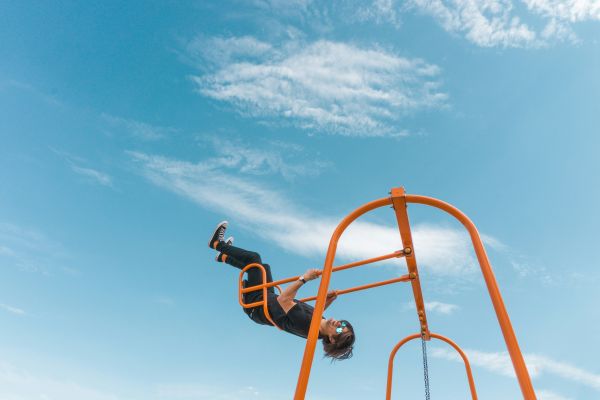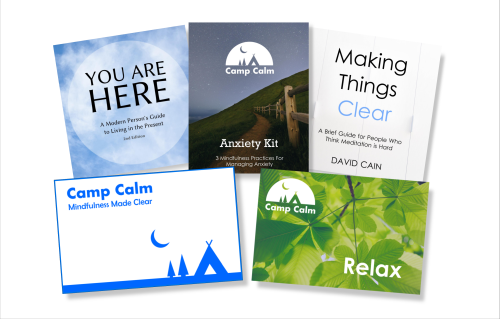
Last year I wrote a post asking readers to consider how much they’d pay for a hypothetical miracle medicine that lengthens your life, makes you happier, reduces anxiety, lowers risk of disease and injury, increases personal confidence, and literally makes you more attractive, along with dozens of other benefits.
The only catch is that you can’t pay money for it, not directly. You gain and maintain access to it by doing a few hours of manual labor per week.
The punchline was that this miracle medicine deal isn’t actually hypothetical; it exists in our world and is available on precisely the above basis. It’s called “regular physical exercise.”
Not everybody takes this deal –- a few hours of labor per week for incalculable benefits – which is crazy when you frame it this way. We pay a lot more for things that don’t provide anything approaching the same return. But humans are like that.
The Other Incredible Deal
Mindfulness ability is a similar deal: a hyper-beneficial medicine that can’t be bought directly, yet may be accessed by devoting regular periods to a certain kind of work.
Its benefits are subtler and harder to describe than those of exercise, which makes it even less popular. The usual claims are that meditation makes you less stressed out, generally wiser, and better able appreciate ordinary life. This is all true, but I don’t think these claims capture the depth and breadth of transformation it can make to a life.
I’ll explain why I think that, but in any case we can at least be happy that a regular mindfulness practice comes at a significantly lower time and labor cost than a regular exercise routine. To get this Other Incredible Deal, you don’t need to hoist barbells over your head or run until your lungs burn. Instead, you need to sit down for a bit, on a daily basis, to practice using your attention in a certain unusual way.
Basically, you sit there, and you notice what happens. You notice sounds. You notice body sensations, both pleasant and unpleasant ones. You notice the mind doing mind stuff: talking to itself, making pictures, rehashing bits of conversation, replaying bits of songs.
You don’t worry about any of this. You just allow it to happen, in a kind of “hands off” way. For once — just for this ten or twenty minutes — you’re not trying to fix anything, or “solve” what’s happening as though it’s a problem. You commit to simply observing and allowing it all instead.
This feels unusual at first, but you do your best.
A period of time set aside to practice mindfulness like this is called meditation. It is the work that gives you access to the Other Incredible Deal and its benefits. The minimum effective dose is perhaps ten minutes daily. More time is better, but the good deal starts about there.
Each time you practice, it strengthens a certain mental skillset, which frees you, gradually, from the usual neediness and fear with which adult humans tend to engage life.
In other words, meditation lowers trepidation in general. It makes you calmer and wiser over time, reducing your reliance on things being easy or agreeable.
How it does this is a good question that deserves an answer. The best way I can do that is with an analogy to skiing over bumpy terrain, which I expound on in this post.
Essentially, meditation trains your mental reflexes to meet the moment-to-moment emotional “bumps” in experience –- which life is riddled with — in a relaxed, supple, confident way, just as an experienced skier calmly adjusts to rises and dips in the slope.
From the post:
What if there was a way you could train your whole mind-body system to gracefully handle the bumpy terrain of everyday life, regardless of what form it took: disappointment, elation, uncertainty, temptation, overexcitement, shame, expectation, tension, and everything in between? Imagine this training allowed you to cruise smoothly over all these familiar contours in a way that felt good, at least more of the time.
To use a cliché, mindfulness ability expands your “comfort zone” in a fundamental way. You get used to letting feelings and sensations come and go naturally, without having to constantly manage them or brace yourself against them.
Whatever your life is like, reducing trepidation like this will always open new paths forward. Imagine turning a dial that lowers the self-imposed “walls” in your life a few notches — the ones between you and your desired habits, goals, social connections, and career possibilities.
Certain things that were impossible might become possible. Things that were merely possible might become doable. Things that were doable might become easy. Things that were easy might become trivial.
That’s the dry, bird’s-eye view anyway. The way wisdom manifests itself in your life is often more colorful, and specific to particular corners of it: while you practice piano, maybe you no longer tense up in anticipation of mistakes; you can more patiently work out an idea expressed in an old book; you aren’t annoyed to take out the garbage anymore. The bumps don’t knock you off balance so easily, or frighten you away altogether.
So that’s the Other Incredible Deal –- somewhat easier than physical exercise, but with its own incalculable, compounding benefits.
(Note that it can also dial down the psychological barriers to taking the original Incredible Deal; if I didn’t meditate, I don’t think I’d be able to get myself to exercise.)
A Thing I’m Doing
Raptitude’s main focus, for most of its existence, has been attempting to get as many people as possible benefiting from this profoundly good deal. Over the years I’ve built a small fleet of how-to books and courses on various mindfulness practices.
However, I’m not developing any new ones right now. My current focus is on helping my fellow productivity-challenged people (serious procrastinators, ADHDers, the highly distracted among us) to get unstuck. There’s a huge need for that kind of help, and I’m in a position to offer it, so that’s my focus right now.
Meanwhile, I’ve got all these mindfulness resources that I barely mention. My courses have been closed for some time, and I never talk about the books.
I had expected to relaunch it all with a major update and a new product, but now I know I’m not going to do that for a while.
Instead, I’m going to have a one-time sale for Raptitude’s 15th anniversary. I’m offering all of my mindfulness resources, in a single bundle, for a huge discount.
That includes five things:
- Camp Calm: 30 Days of Mindfulness (course) Develop a simple, consistent meditation practice over a 30-day period.
- Camp Calm Relax: Mindfulness for Relaxation (course) Learn a meditation technique designed to promote physical and mental relaxation.
- You Are Here: A Modern Person’s Guide to Living in the Present (ebook) Explore ideas and techniques for practicing mindfulness in daily life.
- Making Things Clear: A Brief Guide for People Who Think Meditation is Hard (ebook) Learn to avoid the common ways people make meditation harder than it needs to be.
- Camp Calm Anxiety Kit (ebooklet) Three mindfulness techniques for managing anxiety.
All of these resources work as standalones. You can read the books and do the courses in any order, at any time.
Full price for the collection is over $200. As of right now you can get it all for $79 USD*. This is less than the price of Camp Calm by itself.
You’ll have lifetime access to all the material. Also, those buying the bundle will be invited to participate in future group sessions of Camp Calm, for free. There will be a group session later this year, but by then the course will be full price.
This sale will only be on for ten days, starting now, and then that’s it. After that I’m gone on a meditation retreat of my own, totally offline, so there can be no latecomers!
There are lots of ways to learn mindfulness skills – this is by no means your only chance to do that. But if you like my approach to things, this might be a good way in for you, and today might be as good a day as any to start.
***
*Some countries add VAT to this. I can’t do anything about it, sorry :)








 I'm David, and Raptitude is a blog about getting better at being human -- things we can do to improve our lives today.
I'm David, and Raptitude is a blog about getting better at being human -- things we can do to improve our lives today.
{ 9 Comments }
Funny, but for me getting myself to exercise is million times easier than getting myself to meditate. About two years ago I changed my habits completely, started going to the gym, started doing new sports, started going on walks etc. because I quickly saw the benefits of movement and the incredible positive impact it has almost instantly on my physical and mental state. I can’t imagine NOT to move/exercise anymore. Somehow, even though I know FOR SURE that meditation is incredibly beneficial, and can bring so many great results, both short and long-term, and I know all the theory there is, I read so many books, tried so many exercises, I cannot get myself to sit and meditate. It’s as if I was too overwhelmed with my thoughts. As if my mind was too „active”. As if I wasn’t patient enough. I have no idea what it is but I feel soooo stuck. I can’t even explain it. I wish I could. I think my nervous system just can’t handle the stillness somehow. :( At the same time I LOVE being in nature, admiring it, hearing the birds, I feel so calm and connected when I can do it. But at home — in my own mind, something doesn’t click. :( I feel I need it but seems I can’t get there. Even if I try to remember the nice feeling that I have after a „successful” relaxation, I can’t get myself to sit and meditate. So even that proof doesn’t motivate me. Not sure why the short term benefit motivates me so much to do sports daily but doesn’t motivate me enough to meditate.
Glad to hear that you’ve crossed that threshold where it’s hard to imagine not exercising. That’s one great thing about exercise — there are a lot of short-term benefits, particularly once you’ve passed the beginner discomfort stage.
What you describe with meditation is very common. Restlessness is an intense feeling, and if you’ve always responded to it by getting up and doing thing it will seem like you simply can’t just be with it. This is similar to the beginning of the exercise journey, where exertion just feels so horrible that you can’t imagine doing this again and again.
But as you know, when you open to the thing you think you can’t open to, it really does ease up on you, and can even feel good.
The trick is to open up to it very gradually. You could just sit down for a few minutes, and get interested in that sense of restlessness: what is it, where do you feel it, what patterns does it have? Then experiment with allowing it, even for just a few seconds at a time. I swear to you it will not stay unbearable for long. It’s only if you always respond to it by rejecting it (by fighting it or getting up and doing something) that it seems like a real wall you can’t break through.
Thank you for your reply. I feel very lucky indeed that I managed to pass that threshold with exercise, I know that for many people it’s a real struggle. Hopefully one day I can also pass it with meditation. :) I almost gave up on trying, but I will try again. Thanks, David.
Love this one. The meditation is easy – the exercise (regular) not so much. I tend to ‘rest on my laurels’ as I taught fitness for 18 years – then did a bunch of other physical stuff. LOVE your photos and captions, David. Hardly any comments?? Maybe people are either exercising or meditating. Hopefully. xoxo
I really like doing pictures and captions; I should have always done it this way.
David,
I loved this article.
“you aren’t annoyed to take out the garbage anymore.”
For anyone who is hesitant to try meditation, but also thinks that taking out the garbage sucks, I urge you to give it a try. This might be one of the most underrated benefits I have received.
I’ve been meditating for about 4 years, and I don’t plan on stopping. Each day brings a new positive, a new insight, an improved way of relating to the world.
It will suck at first. That’s OK. Reward yourself in little ways when you keep going. I’m rooting for you!
The garbage and a thousand other things. Being curious about how even mundane things will unfold just plain makes things interesting. Like a little 90-second adventure.
This article was great timing and a reminder of Camp Calm. I did it years ago and just restarted it today. Such a wealth of information and practices, and the format of a camp experience makes it fun and engaging. I am an experienced meditator but maintaining a daily practice is a struggle when the going gets tough so this is a good step toward making it part of my routine, and also being more present through mindfulness.
I highly recommend a consistent, daily meditation practice! For years I was interested in meditation, but never did much more than read a lot about it, and think a lot about it… but that doesn’t hold a candle to actually sitting and meditating every day.
I find it helpful to keep a meditation log, you can even find forums online where people post their meditation logs to get advice and have discussions with other fellow meditation practitioners. Or, you can just log for yourself to keep up the habit and track progress over time.